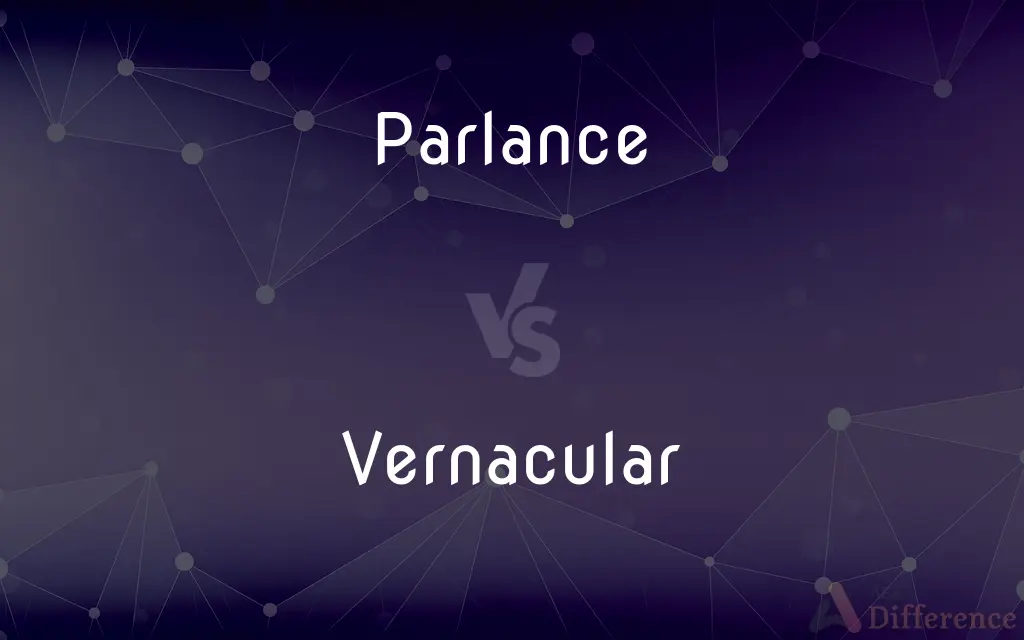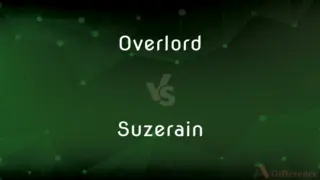Parlance vs. Vernacular — What's the Difference?

Difference Between Parlance and Vernacular
ADVERTISEMENT
Compare with Definitions
Parlance
A particular manner of speaking; idiom
Legal parlance.
Vernacular
A vernacular or vernacular language refers to the language or dialect that is spoken by people that are inhabiting a particular country or region. The vernacular is typically the native language, normally spoken informally rather than written, and seen as of lower status than more codified forms.
Parlance
Speech, especially a conversation or parley.
Vernacular
The language or dialect spoken by the ordinary people in a particular country or region
He wrote in the vernacular to reach a larger audience
Parlance
A certain way of speaking, of using words; especially that associated with a particular job or interest.
ADVERTISEMENT
Vernacular
Architecture concerned with domestic and functional rather than public or monumental buildings
Buildings in which Gothic merged into farmhouse vernacular
Parlance
Of a word, the quality of being lexicalized; especially as jargon or slang.
Vernacular
(of language) spoken as one's mother tongue; not learned or imposed as a second language.
Parlance
Speech, discussion or debate.
Vernacular
(of architecture) concerned with domestic and functional rather than public or monumental buildings
Vernacular buildings
Parlance
Conversation; discourse; talk; diction; phrase; as, in legal parlance; in common parlance.
A hate of gossip parlance and of sway.
Vernacular
The everyday language spoken by a people as distinguished from the literary language.
Parlance
A manner of speaking that is natural to native speakers of a language
Vernacular
A variety of such everyday language specific to a social group or region
The vernaculars of New York City.
Vernacular
The specialized vocabulary of a particular trade, profession, or group
In the legal vernacular.
Vernacular
The common, nonscientific name of a plant or animal.
Vernacular
Native to or commonly spoken by the members of a particular country or region.
Vernacular
Using the native language of a region, especially as distinct from the literary language
A vernacular poet.
Vernacular
Relating to or expressed in the native language or dialect.
Vernacular
Of or being an indigenous building style using local materials and traditional methods of construction and ornament, especially as distinguished from academic or historical architectural styles.
Vernacular
Occurring or existing in a particular locality; endemic
A vernacular disease.
Vernacular
Relating to or designating the common, nonscientific name of a biological species.
Vernacular
The language of a people or a national language.
A vernacular of the United States is English.
Vernacular
Everyday speech or dialect, including colloquialisms, as opposed to standard, literary, liturgical, or scientific idiom.
Street vernacular can be quite different from what is heard elsewhere.
Vernacular
Language unique to a particular group of people.
For those of a certain age, hiphop vernacular might just as well be a foreign language.
Vernacular
A language lacking standardization or a written form.
Vernacular
Indigenous spoken language, as distinct from a literary or liturgical language such as Ecclesiastical Latin.
Vatican II allowed the celebration of the mass in the vernacular.
Vernacular
(architecture) A style of architecture involving local building materials and styles, not imported.
Vernacular
Of or pertaining to everyday language, as opposed to standard, literary, liturgical, or scientific idiom.
Vernacular
Belonging to the country of one's birth; one's own by birth or nature.
A vernacular disease
Vernacular
(architecture) Of or related to local building materials and styles; not imported.
Vernacular
(art) Connected to a collective memory; not imported.
Vernacular
Belonging to the country of one's birth; one's own by birth or nature; native; indigenous; - now used chiefly of language; as, English is our vernacular language.
His skill in the vernacular dialect of the Celtic tongue.
Which in our vernacular idiom may be thus interpreted.
Vernacular
The vernacular language; one's mother tongue; often, the common forms of expression in a particular locality, opposed to literary or learned forms.
Vernacular
A characteristic language of a particular group (as among thieves);
They don't speak our lingo
Vernacular
The everyday speech of the people (as distinguished from literary language)
Vernacular
Being or characteristic of or appropriate to everyday language;
Common parlance
A vernacular term
Vernacular speakers
The vulgar tongue of the masses
The technical and vulgar names for an animal species
Share Your Discovery

Previous Comparison
Overlord vs. Suzerain
Next Comparison
Solely vs. Wholly














































